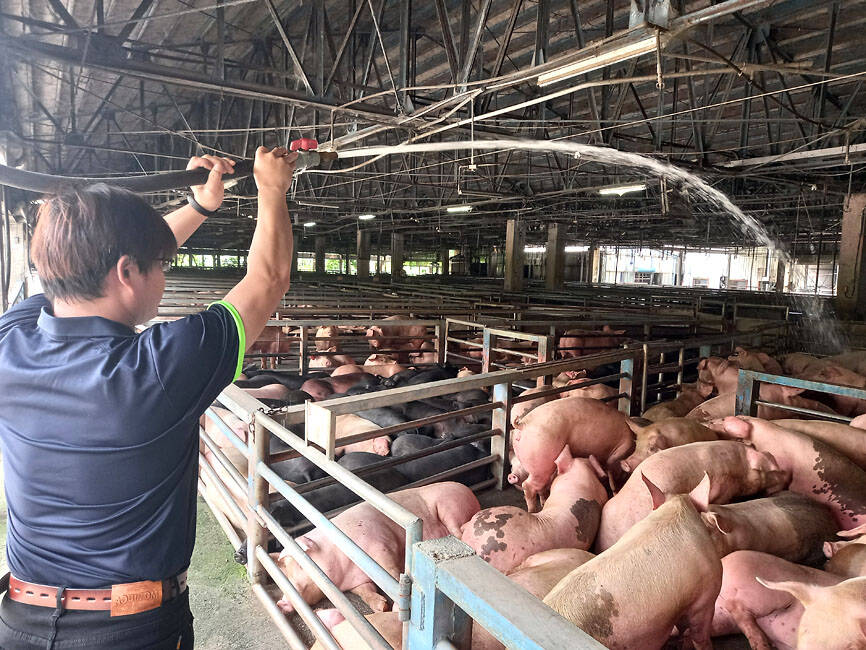Pork butchers in Yilan County must take four days off per week from this week due to a nationwide pig shortage, the Yilan County Livestock and Meat Trade Association said yesterday.
Nearly 200 pork butchers operating in traditional markets in the county were forced to take additional days off beyond their usual Monday and Tuesday days off, as the swine supply has been affected by epidemic diseases and extreme weather conditions.
Friday has been listed as a non-work day since June due to a supply shortage, while Thursday was also included last week, as the Yilan County meat market could not obtain sufficient live pigs for auction

Photo: Chiang Chih-hsiung, Taipei Times
That means all pork butchers in the county would close four days a week and open only on Wednesdays, Saturdays and Sundays.
The county meat market’s live pig demand is about 420 pigs per day, and more than 60 percent are supplied from outside the county.
The average auction price of live pigs in the county was NT$100 per kilogram in mid-May, but the aggravated shortage had driven it up to a record high NT$119.64 on Friday last week — a surge of nearly NT$20 in less than three months.
The association yesterday in a statement said that pork is the most widely consumed meat in Taiwan and the shortage of live pigs has many implications.
Pork butchers were forced to take unpaid leave, while consumers were unable to buy fresh, undressed pork at any price, it said.
If the shortage continues, the shops might have to take five days off per week, the association said, adding that the authorities should help to bring the market back to normal as soon as possible.
Yilan County Agriculture Department Director Lee Hsin-tai (李新泰) on Saturday said that diarrhea killed many piglets nationwide around the beginning of this year and caused a swine shortage during the Dragon Boat Festival holiday.
The shortage was further exacerbated when Typhoon Danas hit Taiwan last month and devastated pig-farming facilities in central and southern Taiwan, he said.
As the swine supply capacity might not recover soon, the county government has asked the meat market to procure as many pigs as possible from pig farmers to meet consumer demand, Lee said.
The Ministry of Agriculture’s Department of Animal Industry Deputy Director-General Chou Chih-hsun (周志勳) yesterday said that the supply of live pigs fell over the short-term due to extreme heat this summer, as well as disaster situations caused by the typhoon and heavy rainfall last month.
The ministry has asked Taiwan Sugar Corp to help supply an additional 650 live pigs to the county this month, and asked slaughter and cold-storage plants to reduce their purchases to stabilize pork production and supply, he said.
Data from the National Animal Industry Foundation showed that the number of live pigs traded domestically was 21,034 on Friday, at an auction price of NT$111.39 per kilogram, before dropping to 12,184 at NT$112.69 on Saturday.
Swine supplies have declined nationwide, affected not only by high temperatures in the summer, epidemic diseases and environmental concerns, but also by last month’s natural disasters, Chou said.
Pork prices are increasing due to the low supply and high demand for the upcoming Ghost Festival and Mid-Autumn Festival, he said.
As the weather would improve and production would recover, pork prices are expected to return to normal in October, Chou said.

The Ministry of Foreign Affairs (MOFA) yesterday voiced dissatisfaction with the Comprehensive and Progressive Agreement for Trans- Pacific Partnership (CPTPP), whose latest meeting, concluded earlier the same day, appeared not to address the country’s application. In a statement, MOFA said the CPTPP commission had "once again failed to fairly process Taiwan’s application," attributing the inaction to the bloc’s "succumbing to political pressure," without elaborating. Taiwan submitted its CPTPP application under the name "Separate Customs Territory of Taiwan, Penghu, Kinmen and Matsu" on Sept. 22, 2021 -- less than a week after China

THE GOOD WORD: More than 100 colleges on both sides of the Pacific will work together to bring students to Taiwan so they can learn Mandarin where it is spoken A total of 102 universities from Taiwan and the US are collaborating in a push to promote Taiwan as the first-choice place to learn Mandarin, with seven Mandarin learning centers stood up in the US to train and support teachers, the Foundation for International Cooperation in Higher Education of Taiwan (FICHET) said. At the annual convention of the American Council on the Teaching of Foreign Languages held over the weekend in New Orleans, Louisiana, a Taiwan Pavilion was jointly run by 17 representative teams from the FICHET, the Overseas Community Affairs Council, the Steering Committee for the Test of Proficiency-Huayu, the

A home-style restaurant opened by a Taiwanese woman in Quezon City in Metro Manila has been featured in the first-ever Michelin Guide honoring exceptional restaurants in the Philippines. The restaurant, Fong Wei Wu (豐味屋), was one of 74 eateries to receive a “Michelin Selected” honor in the guide, while one restaurant received two Michelin stars, eight received one star and 25 were awarded a “Bib Gourmand.” The guide, which was limited to restaurants in Metro Manila and Cebu, was published on Oct. 30. In an interview, Feng Wei Wu’s owner and chef, Linda, said that as a restaurateur in her 60s, receiving an

MORE RETALIATION: China would adopt a long-term pressure strategy to prevent other countries or future prime ministers following in Sanae Takaichi’s steps, an academic said Taiwan should maintain communications with Japan, as Japanese Prime Minister Sanae Takaichi is to lead a revision of security documents, Taiwanese academics said yesterday. Tensions have risen between Japan and China over remarks by Takaichi earlier this month that the use of force against Taiwan would constitute a “survival-threatening situation” for Japan. Prospect Foundation president Lai I-chung (賴怡忠) yesterday said Takaichi’s stance regarding Taiwan is the same as past Japanese prime ministers, but her position is clearer than that of her predecessors Fumio Kishida and Shigeru Ishiba. Although Japan views a “Taiwan contingency” as a “survival-threatening situation,” which would allow its military to